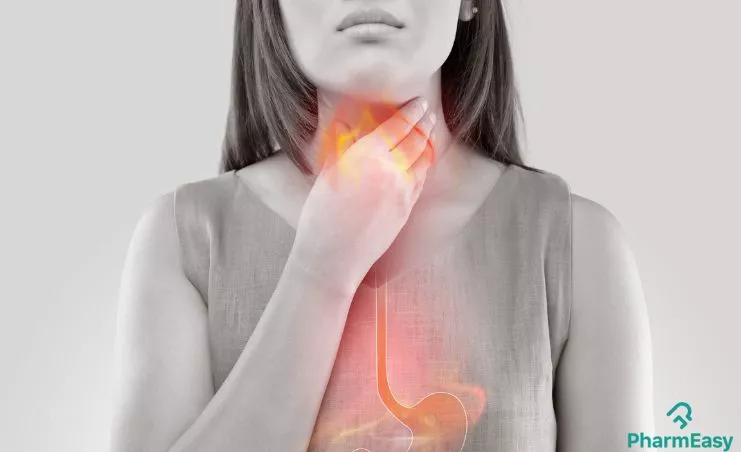How to Fight Gastroesophageal Reflux Disease?
By Dr. Nikita Toshi +2 more

Get,

to manage your symptom
Get your,


4 Cr+ families
benefitted

OTP sent to 9988776655



You’ve successfully subscribed to receive
doctor-approved tips on
Whatsapp

Get ready to feel your best.

Hi There,
Download the PharmEasy App now!!


Register to Avail the Offer
Send OTPBy continuing, you agree with our Privacy Policy and Terms and Conditions

Hi There,
Sign up on PharmEasy now!!
Trusted by 4 crore+ families

OTP sent to 9988776655



You have unlocked 25% off on medicines




Code: NU25



By Dr. Nikita Toshi +2 more
Table of Contents
Are you having a recurrent heartburn? If yes, then probably you should see your doctor as you may suffering from gastroesophageal reflux disease also known as GERD.

Gastroesophageal refers to the stomach and esophagus. Reflux means to flow back or return. Therefore, gastroesophageal reflux is the return of the stomach contents back up into the esophagus. GERD affects people of all ages – from infants to older adults.
It is a digestive disorder that occurs when stomach acid frequently flows back into the esophagus. This backflow (acid reflux) can irritate the lining of the esophagus. GERD occurs when the lower end of the esophagus become weak and not able to open or close properly.
It is a chronic condition where you can have complaints more than twice a week. It is a quite common problem among the urban population due to a sedentary lifestyle, overeating, etc. Here are some causes of GERD –
Some conditions that increase your risk of GERD are as follows –
Most of the signs and symptoms worst during the night while lying down and less in the day time. If you have persistent heartburn for a longer time then you must visit your doctor.
Your doctor may perform a test to confirm your diagnosis of GERD which can measure the acid content of your esophagus. Also, he/she may examine your esophagus for damage to measure muscle contractions in your esophagus or look at your entire upper digestive tract. Do not self-diagnose or take medications without proper consultation.
Heartburn or GERD symptoms can last around 2-4 hours until the food leaves your stomach and goes into your small intestine. Even after that point, you can have symptoms return later on. This could go on and repeat for days or weeks if left untreated. Some people’s symptoms may disappear within a few weeks with lifestyle changes and over-the-counter medications, for some it may worsen as the disease progresses.
Dr. Ashish Bajaj – M.B.B.S, M.D.
The first step to treat this disease to change your lifestyle such as changing what you eat or drink. If the complaints persist then your doctor may advise you some medicines such as proton pump inhibitor or histamine – 2 blockers. In the extreme case, the doctor might opt for surgery.
The following lifestyle changes can ease your symptoms:
Also including certain food in the everyday diet helps in treating GERD:
Ginger is very useful for digestive issues since ancient times. It acts as an anti-inflammatory. Just drink ginger tea daily to keep your digestive system healthy.
It contains a large number of probiotics that are helpful for your gut system. It is good to increase healthy bacteria in your gut to keep your guts clean and healthy. It also reduces the frequency of acid reflux.
Fennel seeds act as a cleanser for your gut system and having anti-bacterial properties to kill bacteria in the stomach. The nutrient of fennel seeds helps in relaxing the stomach walls and thereby prevents acid reflux.
Oatmeal contains a high amount of fiber which helps to reduce the symptoms of acid reflux and heartburn.
Lifestyle changes is very effective in GERD. Weight loss and tobacco smoking cessation should be recommended to GERD patients who are obese and smoke, respectively. Avoiding late evening meals and head of the bed elevation is effective in nocturnal GERD.
Dr. M.G. Kartheeka, MBBS, MD
Damage to the lower esophagus from stomach acid causes scar formation. The scar tissue narrows the food pathway, leading to problems with swallowing.
Damage from acid can cause changes in the tissue lining the lower esophagus. These changes are associated with an increased risk of esophageal cancer.
The actual reason is unknown to understand how and why asthma is aggravated by GERD. Maybe due to recurrent irritation of lung nerves, asthma may induce.
Also Read: 5 Instant Home Remedies For Gastric Problem
Stomach acid can cause an injury to tissues in the esophagus, causing an open sore to form. An esophageal ulcer can bleed, cause pain, and make swallowing difficult.
It is a chronic and sometimes life-long health condition to deal with. Early diagnosis and proper treatment can control or cure your symptoms. Left untreated, however, GERD can cause permanent damage to the esophagus.
Disclaimer: The information provided here is for educational/awareness purposes only and is not intended to be a substitute for medical treatment by a healthcare professional and should not be relied upon to diagnose or treat any medical condition. The reader should consult a registered medical practitioner to determine the appropriateness of the information and before consuming any medication. PharmEasy does not provide any guarantee or warranty (express or implied) regarding the accuracy, adequacy, completeness, legality, reliability or usefulness of the information; and disclaims any liability arising thereof.
Links and product recommendations in the information provided here are advertisements of third-party products available on the website. PharmEasy does not make any representation on the accuracy or suitability of such products/services. Advertisements do not influence the editorial decisions or content. The information in this blog is subject to change without notice. The authors and administrators reserve the right to modify, add, or remove content without notification. It is your responsibility to review this disclaimer regularly for any changes.

Leave your comment...

View all comments(1)
Nice article…very helpful